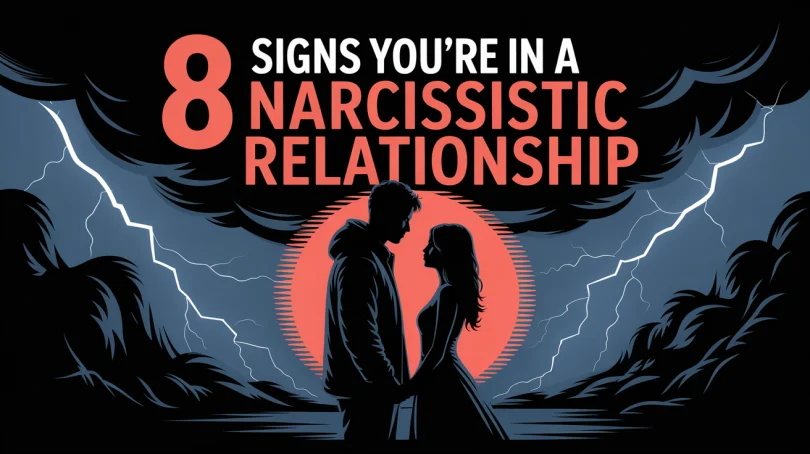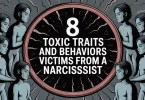Today, we’re diving into a topic that affects countless individuals: narcissistic abuse. Many struggle to recognize whether they’re experiencing this toxic dynamic. The confusion, self-doubt, and emotional turmoil that come with it can make it difficult to see the situation. That’s precisely why we’re here today to bring awareness and offer guidance to help you reclaim your power and break free from narcissistic abuse.
This isn’t just about romantic relationships. The signs we’re about to discuss can apply to any toxic connection, whether it’s a spouse, partner, family member, friend, colleague, or even a neighbor.
1. Your relationship lacks kindness, stability, and mutual respect.
Narcissistic relationships often leave you feeling lost, questioning yourself, and doubting reality. That’s because a toxic person will twist situations, shift blame, and refuse to take responsibility for their actions. If someone continuously hurts you without remorse and avoids accountability, the truth is, they will likely never change.
The key to a healthy relationship is mutual respect, understanding, and emotional safety. For example, imagine you try to express your feelings about something that upset you, and instead of listening, the other person turns it around, making you feel guilty for even bringing it up. Over time, this constant invalidation can make you feel like your emotions don’t matter.
Related Topics:
7 Habits That Prove You’re An INFJ Type
How Narcissists Try to Control You?
5 Weird Ways Toxic Family Members Punish a Truthteller for Going No Contact
2. You find yourself sacrificing your values to keep the peace.
Narcissists tend to react explosively over minor things, making you feel like you’re constantly walking on eggshells. You might start censoring yourself or avoiding certain topics just to prevent conflict. Over time, you might even compromise your morals and comfort just to avoid their anger or rejection.
That’s not a healthy dynamic it’s manipulation. For example, suppose you strongly value honesty, but every time you call out their lies, they lash out or give you the silent treatment. To avoid conflict, you stop confronting them altogether, even though it goes against your values.
3. You feel out of character angry, anxious, or unlike yourself.
Take a moment to reflect on how you feel in this relationship compared to other interactions in your life. Do you generally get along with most people, yet with this person, you feel drained, defensive, or even act in ways that aren’t like you? This usually happens because your boundaries are constantly being crossed, leaving you emotionally dysregulated.
For example, you’re normally a calm and patient person, but in this relationship, you find yourself constantly reacting with frustration or anxiety. This is because you’re in a state of emotional survival, always anticipating the next conflict.
4. You constantly try to prove you’re a good person.
A narcissist will often project their flaws onto you, accusing you of selfishness, dishonesty, or lack of empathy. In an attempt to defend yourself, you might find yourself over-explaining, justifying your actions, or going above and beyond to prove your worth. This endless cycle only keeps you hooked into their control.
For example, they might say, “You never do anything for me,” despite all the effort you put into the relationship. In response, you work even harder to prove them wrong, even though they will never acknowledge your contributions.
5. You’re always cleaning up their messes.
Life with a narcissist often involves constant chaos. They may be irresponsible, reckless, or lack accountability, leaving you to fix their problems. Whether it’s paying their debts, making excuses for their behavior, or covering up their lies, you end up prioritizing their needs over your well-being.
The more you try to keep their life in order, the more drained and neglected you become. For example, they might frequently quit jobs or rack up financial debt, expecting you to bail them out. Instead of taking responsibility, they shift the burden onto you, making you feel obligated to rescue them.
6. Your boundaries are consistently disrespected.
Do you struggle to stand up for yourself with this person, and when you do, do they criticize, reject, or punish you for it? If speaking up leads to manipulation or threats of abandonment, you may find yourself giving in just to avoid the fallout. Over time, this erodes your sense of self and leaves you feeling powerless.
For example, if you ask for space, they guilt-trip you by saying things like, “I guess you don’t love me anymore,” making you feel like your needs are wrong or selfish.
7. You feel addicted to the relationship despite the pain.
Narcissistic relationships create a psychological phenomenon known as the trauma bond. The highs of affection and attention, followed by emotional cruelty, create an addictive cycle that makes it difficult to end the relationship.
Even if you know the relationship is toxic, you may find yourself drawn back in, hoping for change. This isn’t love it’s a conditioned response to manipulation. For example, after a particularly hurtful episode, your partner suddenly showers you with affection and gives you renewed hope, only to start the vicious cycle of abuse all over again.
8. Your mental and physical health suffers.
As the emotional strain of the relationship increases, it begins to manifest itself in your overall well-being. Anxiety, depression, chronic fatigue, and even physical illnesses like adrenal fatigue or PTSD can occur. You may isolate yourself, lose interest in things that once brought you joy, or feel trapped in a state of hopelessness.
This is a serious sign that it’s time to prioritize your healing. For example, you used to be outgoing and energetic, but now you have trouble getting out of bed, you have frequent headaches, or you feel emotionally numb. Your body is signaling to you that something is fundamentally wrong.
Now, take a deep breath and ask yourself: How much are you willing to endure before you choose yourself? Narcissistic behavior exists on a spectrum, and not everyone who displays selfish tendencies has a full-blown narcissistic personality disorder.
However, if someone consistently ignores your feelings and well-being, this is not a relationship that will foster your growth and happiness. Once we stop trying to change others and focus on our healing, we regain our power. Breaking up isn’t always easy, but doing so opens the door to a life filled with true love, self-respect, and inner peace.







Leave a Comment